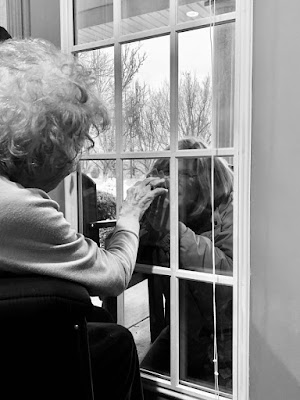Visitation Restrictions Taking a Heavy Toll
Seniors living in long-term care facilities, and their families, still have a heavy burden to bear with government-mandated visitation restrictions firmly in place.
On March 11, Ohio Gov. Mike DeWine issued an order limiting the number of visitors at nursing homes and assisted living communities to one visitor, per resident, per day. Soon thereafter, visitation was almost completely prohibited with a few exceptions, such as end of life. Read more here.
According to the Centers for Disease Control and Prevention (CDC), seniors with severe underlying conditions like heart disease, lung disease, or diabetes seem to be at high risk for developing serious complications or dying from COVID-19. Community living makes the highly contagious nature of this virus an even more threatening proposition for older adults.
We understand why visitation restrictions are necessary. Like all responsible healthcare providers, we are committed to preventing the spread of coronavirus among our patients and residents.
But we are also deeply concerned with the heavy toll visitation restrictions are now taking on seniors and the elderly who have not seen their families for weeks. We've heard it described as a little loneliness, but it's starting to feel like more than a little loneliness.
Research has it that loneliness can wreak havoc on an individual's well-being. Lacking encouragement and reassurance from family and friends has been linked to depression, poor sleep quality, accelerated cognitive decline, and impaired cardiovascular function. A 2016 study by researchers at Newcastle University showed a correlation between loneliness and a 30 percent increase in stroke and coronary heart disease. In short, social isolation has the potential to compromise physical, mental, and cognitive health. Read more here.
Our residents are dealing with more restlessness and anxiety than ever before. I wish everyone could see what we see," said Toni Shreves, Director at Gardens of Scioto Assisted Living in Columbus, Ohio. "We love these residents. It hurts to see them hurting."
Shreves and her staff are working to combat the effects of physical separation by offering one-on-one activities for residents and encouraging verbal communication with families by phone and face-to-face video visits via FaceTime, Google Hangouts, Skype,or Zoom.
"They need as much interaction as they can get and we are determined to help them stay connected," said Shreves.
Here are some additional tips for families looking to stay connected to loved ones in care communities during this pandemic:
Establish a Schedule to Stay Connected
Checking in at a scheduled time is helpful to both your loved one and staff. Your loved one will be reassured knowing you are committed to regularly scheduled contact. Staff will appreciate the opportunity to plan ahead to offer assistance when needed.Schedule a Recurring Weekly Care Conference
Care conferences provide families and staff an opportunity to discuss needs, goals, and ideas about how best to meet those goals. Care conferences are routine in care settings, but they provide an extra layer of security and peace of mind at this moment in time.




Comments
Post a Comment